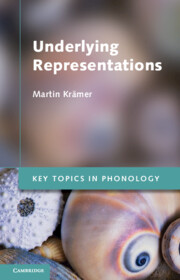Book contents
- Frontmatter
- Contents
- Acknowledgements
- Abbreviations
- 1 Getting started
- 2 Arbitrariness and opposition
- 3 Derivation and abstractness
- 4 Underspecification returns
- 5 The devil is in the detail
- 6 Psycho- and neurolinguistic evidence
- 7 On the form and contents of contrastive features
- 8 Underlying representations in Optimality Theory
- 9 Preliminary results
- Glossary
- Notes
- References
- Name index
- Language index
- Subject index
- References
5 - The devil is in the detail
usage-based phonology
Published online by Cambridge University Press: 05 November 2012
- Frontmatter
- Contents
- Acknowledgements
- Abbreviations
- 1 Getting started
- 2 Arbitrariness and opposition
- 3 Derivation and abstractness
- 4 Underspecification returns
- 5 The devil is in the detail
- 6 Psycho- and neurolinguistic evidence
- 7 On the form and contents of contrastive features
- 8 Underlying representations in Optimality Theory
- 9 Preliminary results
- Glossary
- Notes
- References
- Name index
- Language index
- Subject index
- References
Summary
INTRODUCTION
In the previous chapters we had a look at theories of underspecification and the issue of abstractness in underlying representations in phonological theories. While from a theoretical perspective underspecification is desirable, this doesn’t necessarily have to correspond with psychological reality. Mental representations could be rich and detailed, like high-resolution photographs or like other memories we store in our minds, like the flavour of a particular cheese or an event we have experienced. In this chapter we consider such an approach to underlying representations.
The idea that statistical calculations play an important role in the shaping of language patterns and consequently in lexical storage goes back quite a bit (for a young discipline such as linguistics). Zwirner (1936) held the belief that we cannot properly understand language and language change without statistical methods.
The passage from research into norms for the articulation of speech sounds to the investigation of speech includes the passage from the investigation of language history to a tailored survey of the variation found in language, since these handed down norms for the articulation of speech sounds cannot be met in exactly the same way twice.
(Zwirner 1936: 77; my translation)At the time, scholars such as Saussure, Trubetzkoy and Jakobson brought forth forceful arguments in favour of categorical contrasts, as outlined in Chapter 2. Around sixty years later the use of statistical methods, or better, explanations of linguistic patterns through their statistical properties have gained ground again.
- Type
- Chapter
- Information
- Underlying Representations , pp. 98 - 127Publisher: Cambridge University PressPrint publication year: 2012

